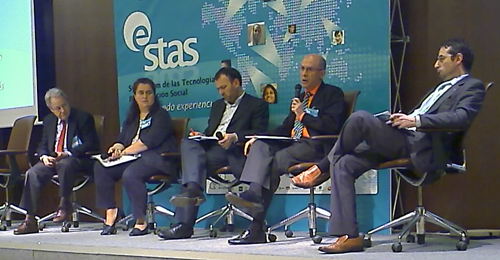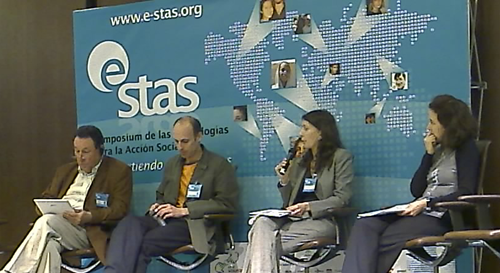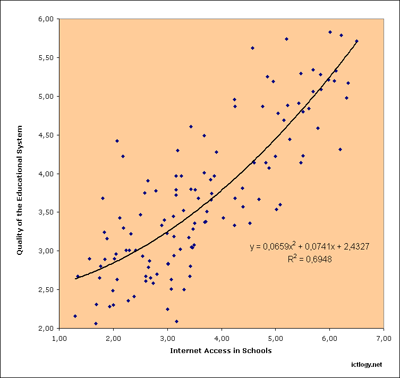By Ismael Peña-López (@ictlogist), 09 May 2008
Main categories: Digital Literacy, e-Government, e-Administration, Politics, e-Readiness, Meetings, Participation, Engagement, Use, Activism
Other tags: Activism, blog, e-Government, education, Engagement, icities, jaume morego, julio meneses, Participation, Engagement, Use, Activism, ricard ruiz de querol, Use
4 Comments »
iCities is a Conference about Blogs, e-Government and Digital Participation.
Here come my notes for session I (part I).
Digital Citizens vs. Analogue Institutions
Ismael Peña-López
These are the materials I’m using at the iCities: Primeras Jornadas sobre Blogs, e-Government y Participación Digital [First Conference on Blogs, e-Government and Digital Participation], for the opening speech, in which I take part on Friday 9th May 2008.
Slides:
Universal McCann (2008).
Wave 3. New York: Universal McCann.
Acknowledgements
Update:Now that the conference is over, hearty and warmest thanks to
Pablo Díaz and
César Calderón for making the conference happen and for having invited me.
Ricard Ruiz de Querol deserves my sincerest gratitude for his always challenging insights about the Information Society. Jaume Moregó also pushed me to a project that payed back with good reflections. A good buch of this conference was inspired by them both, thank you. And also thanks to Julio Meneses for his lightning fast and valuable help with some graphic materials.
iCities 2008, Blogs, e-Government and Digital Participation (2008)
By Ismael Peña-López (@ictlogist), 24 April 2008
Main categories: Cyberlaw, governance, rights, Digital Literacy, Education & e-Learning, ICT4D, Knowledge Management, Meetings, Open Access, Participation, Engagement, Use, Activism
Other tags: e-stas, e-stas2008
No Comments »
e-STAS is a Symposium about the Technologies for the Social Action, with an international and multi-stakeholder nature, where all the agents implicated in the development and implementation of the ICT (NGO’s, Local authorities, Universities, Companies and Media) are appointed in an aim to promote, foster and adapt the use of the ICT for the social action.
Here come my notes for session IV. (notes at random, grouped by speaker, but not necessarily in chronological order)
 Left to right: Francisco Ortiz Chaparro, Belén Perales, Javier Estévez (moderator), Javier de la Nava Trinidad, José Manuel García Prieto
Left to right: Francisco Ortiz Chaparro, Belén Perales, Javier Estévez (moderator), Javier de la Nava Trinidad, José Manuel García Prieto
Belén Perales, IBM
Why corporate volunteering? Employees demand it and their satisfaction, engagement, etc. does increase with nonprofit or development projects engagement. And this does benefit the firms beyond profit.
Francisco Ortiz Chaparro, AHCIET
Public-private partnerships are an important key for the development of the Information Society.
Big firms are kidnapped by their highest directors, that apply for themselves retribution policies that generate huge inequalities within the firm. This is a barrier for both the credibility of the firm as socially committed and the engagement of the rest (the basis) of the employees. Shareholders should enforce their rights to achieve more transparency and accountability of the behavior of such boards of directors, for both economic management and social responsibility reasons.
There is a good amount of nonprofits and projects that are created ad hoc as (public) grant raisers. Nonprofits should change their minds and think on project designs that could include firms and even benefit them, so through a mutual benefit, partnerships between the civil society and enterprises could arise. And, at the same time, the project will gain sustainability.
Javier de la Nava Trinidad, BBVA
The five groups of stakeholders: shareholders, providers, customers, employees, the society at large. And it is not only the customers that a firm has to keep content, but the whole panoply of stakeholders.
There is an increasing need for employers to have their employees engaged and identified with the firm, to be satisfied in their workplaces.
It’s true that telecoms benefit from more ICT use, hence why fostering its use in their corporate strategy.
There is not a single model of cooperation between nonprofits and firms, but normally the model is that firms give away the know how, their knowledge, their human capital, etc.
e-Stas 2008, Symposium on Technologies for Social Action (2008)
By Ismael Peña-López (@ictlogist), 24 April 2008
Main categories: Digital Divide, Digital Literacy, ICT4D, Meetings, Nonprofits, Participation, Engagement, Use, Activism
Other tags: e-stas, e-stas2008
No Comments »
e-STAS is a Symposium about the Technologies for the Social Action, with an international and multi-stakeholder nature, where all the agents implicated in the development and implementation of the ICT (NGO’s, Local authorities, Universities, Companies and Media) are appointed in an aim to promote, foster and adapt the use of the ICT for the social action.
Here come my notes for session III. (notes at random, grouped by speaker, but not necessarily in chronological order)
 Left to right: Raoul Weiler, Jérôme Combaz, María del Mar Negreiro, Berta Maure Rubio
Left to right: Raoul Weiler, Jérôme Combaz, María del Mar Negreiro, Berta Maure Rubio
It will be possible for everyone to access the Internet trough/thanks to low cost devices.
But education will make the difference, not devices.
Jérôme Combaz, Charte pour l’Inclusion Numérique et Sociale
Technology has to be transparent and should address social problems in a social way.
María del Mar Negreiro, European Union Lisbon Strategy
i2010 focuses on uses, digital literacy and how the Internet can help people connect each other, access better jobs, etc. To do so, focus on skills.
Teachers are using — the ones that do — the Internet to prepare their classes, get some materials, but they are not using ICTs when teaching or into the classroom. There still is a reluctance to do so, even if students seem pleased and more motivated when such a thing happens. Lack of skills, lack of time, lack of technical support are among the main reasons adduced by teachers to justify not being more pro-active fostering the use of ICTs when teaching.
Accessibility and usability as a goal to achieve more and better access to the Internet. And, thus, that people find Internet useful for their daily life.
e-Stas 2008, Symposium on Technologies for Social Action (2008)
By Ismael Peña-López (@ictlogist), 09 April 2008
Main categories: Digital Literacy, e-Readiness, Open Access
Other tags: education 2.0, networked readiness index, nri, oer, wef, world economic forum
No Comments »
The World Economic Forum’s Global Information Technology Report 2007-2008 is out. In my opinion, it does not bring any surprises, but reinforces some trends that we’ve been seeing lately:
- The increasing strength and importance of wireless technologies to get connected to the Network
- A gradual shift of the research focus from quantitative/economic impact analysis towards more qualitative/social impact analysis
- Hence, the realization that ICTs are much more than (information) productivity tools, and they have a role in socialization (through communication), mediated by digital literacy
Part of the Global Information Technology Report gets its data from the World Economic Forum’s Executive Opinion Survey, which, conducted annually, captures the perceptions of the leading business and investment decision-makers worldwide (many of whom represent the Forum’s member companies)
. As a qualitative survey, and based on perceptions
, all conclusions arising from it might be taken with tons of caution. Nevertheless, there are some findings that, even if taken with caution, are worth deserving a thoughtspan:
As the chart shows, there is a clear relationship between quality of an educational system (at the aggregate country level) and the existence of not computers but Internet access in schools. As said, while Internet access in schools is measured quantitatively after surveys sent to sample schools in every country, the Quality of the Educational System is a variable measured through a qualitative, subjective indicator after asking the 8,000 interviewees of the Executive Opinion Survey. In the survey, the respondents range the educational system from 0 to 7 whether the Educational system
[serves the] needs of competitive economy
.
Depending on how you agree with the definition of “quality” for a national educational system, and how you’d like the reality to fit your beliefs, different interpretations arise:
- The more straightforward: Internet access increases the quality of the educational system. The more Internet access, the better education.
- Inversely, we can say that high quality educational systems are more eager to introduce the Internet in schools than lower quality ones. The more quality of the system, the more (awareness in) the use of Internet.
- There’s a relationship between educational quality (as understood by the Executive Opinion Survey) and Internet access in schools, but we do not know which is the cause and which the consequence: they just happen to go hand in hand.
Even if some of the previous statements are sweet music for cyberoptimists (like me), I wouldn’t strongly stand for any of it: there are too many loose ends to be axiomatic.
But one thing is absolutely clear: even if we cannot establish (yet) any causality between quality and educational Internet access, the perception is that some degree of relationship does exist. And if this perception is widely shared at both the decision-taker and policy-maker levels, some consequences in the short run would be likely to be expected:
- Firms would be more likely to hire candidates with strong digital competences, as it looks like Internet and quality go together, and quality means a more competitive economy (i.e. firm).
- Stress would then be put in teaching digital skills in the design of educational strategies, along with the introduction of the Internet in the school
- If the Internet — this huge information silo — enters the classroom, the role of the educator should change, and shift from an information holder to a knowledge acquisition enabler or facilitator
- Open educational resources should be coming in and out of the classroom both as input and output
- This abundance of (educational) material would require more and better reputation systems and information assessment systems, all of them based in more and better digital skills
- And back to #1
In the most conservative scenario, I see this as the perception of inflation: regardless whether there is not the slightest chance for inflation to happen, if citizens believe so, there’ll be inflation. The sensation is now that digital skills matter and that we are going to evaluate education under this light. Schools must not just let themselves go along with the current (i.e. the cyberhype), but neither swimming against it.
By Ismael Peña-López (@ictlogist), 27 March 2008
Main categories: Digital Divide, Digital Literacy, ICT4D, Participation, Engagement, Use, Activism
Other tags: actor_network_theory, ethnography, research, telecenter, telecentre
No Comments »
Daniela de Carvalho Matielo presents a PhD seminar at the Internet Interdisciplinary Institute, UOC.
Challenging the digital divide: the role of telecenters in e-inclusion practices.
First, Daniela brings a short introduction to the concept of the Digital Divide as lack of access to ICTs.
Digital Inclusion is then the effort to guarantee everyone has access to the Information Society.
The problem is that there is not only one digital divide, but many: geographical, etc.
These efforts have, hence, many designs, from fiscal incentives to direct provision of Internet access from physical places: telecenters, places people can go to use telecommunication services. The main difference with a cyber cafe is profit — in the latter case — or bridging the digital divide — in the fomer case —.
Three moments of digital inclusion (according to Warschauer):
- Device model: physical access
- Connexion model: access to the Network
- Literacy model: uses and contexts
A shift is now taking place towards a more social-aspects focused strategy:
- What are the main competences to use the computer: digital literacy
- What are the uses that certain communities can give to computers and the Internet: technology appropriation
But it seems that this shift has gone from “technological determinism” to “social determinism”, from an approach where technology would solve each and every problem (cyberoptimism) where just everything can be solved inside the “black box” of the community.
But, technologies are not neutral and the actor-network theory (ANT) can bring some light to the issue.
What do we have so far?
- Official reports about telecenter use and users
- Scientific studies, both qualitative and quantitative
“Community Informatics” is a field whose goal is to analyze the uses of ICTs in communities.
Research Questions / Hypotheses
- Technology plays an important role. This role is usually neglected at higher levels.
- There is a big differnetce between practice and goals in telecenters as stated in their official discourses
Following the ANT, there’s an interaction — chains of association — between users and technologies so, after passing through a “black box”, become from digital illiterate to literate, and from technologies to properly appropriated technologies.
The methodology to be used in this research will be, based on the ANT, do an ethnography in a telecenter to disclose the relationships of technology appropriation by users.
Comments
- Several persons in the audience state that ANT might not be the best approach, as it takes for granted that there is a role performed by technologies, and a relationship technology-user, which is exactly what the research wants to find.
- I state that this could be balanced (theory vs. practice, positivism vs. normativism) by balancing ANT with a participatory action research instead of performing an ethnography.
- Somebody also points that it would be interesting to see how digital literacy (strictly personal) can be complemented with technology socialization, so a social framework is created through technology, so the digital literate can then interact “technologically” with others, and socialize.
By Ismael Peña-López (@ictlogist), 03 March 2008
Main categories: Digital Divide, Digital Literacy, e-Readiness, ICT4D
3 Comments »
In a recent event where I was invited to debate about the need whether to foster the Information Society, I was shocked about some positions from both some of the speakers on the round table I participated in and the audience.
The starting point was: is there a need to foster the Information Society, or the Web 2.0 is a sufficient empowerer so there’s no reason to set up centralized strategies and policies?
One of the first arguments to come to debate can be summed up by “if people find no interest on the Internet, they will not use it, even if the infrastructures are ready and affordability is good enough”.Which I absolutely share: people like Lenhart (2000), Compaine (2001) or Parks Associates (2007) have already given evidence about this fact — this is, of course, especially relevant in developed countries, but it is also true in the poorest parts of them, so extrapolation to developing ones could be possible.
The next argument comes straightforward: we cannot force anyone to enter the Information Age. Again, I agree.
Disagreement comes with the next statement, primarily defended by the political representatives in the room: neither should we force anyone to enter the Information Age nor should we try to convince them to. Otherwise, we would be patronizing them, being paternalistic and acting like enlightened elites, and so on. We have to stop being cyberoptimists: people know better than anyone what their needs are, if people just want to share their photos, the only thing we [the government] have to do is to offer [subsidized] Flickr courses for anyone
.
The argument is: don’t trust the doctor, because he’s being an enlightened elite prescribing antibiotics for your infection (not trying to save your life); don’t trust anyone that tells you to fix your roof, because he’s being paternalistic and patronizing (not just giving advice against it collapsing with the next rain).
The evidence of the economic impact of ICTs is great and growing. And there is plenty of people out there doing research about the issue. Elites? Not at all: people (scholars, politicians and experts in general) whose job (they are paid for it) is to give advice i.e. on the consequences on the job market of being digitally literate… or illiterate. You can disagree on interpretations, but not on data.
Honestly, I think that, these days, the difference between cyberoptimists and cyberskeptics is tiny:
- Cyberoptimists will tell you that there’s plenty of evidence of the coming of age of the Information Society and that the potential possibilities are many
- Cyberskeptics will tell you that there’s no evidence of huge benefits of entering the Information Society, but will agree that there are huge losses of not doing it (i.e. you might not increase your productivity being digitally literate, but you’ll surely loose it if you’re not)
The rest of the story is about swindlers and cyberblind. Yours to choose.




